Tribhuvanatha Das Remembrance Festival Celebrates Legendary Preacher
By Madhava Smullen | Dec 08, 2019
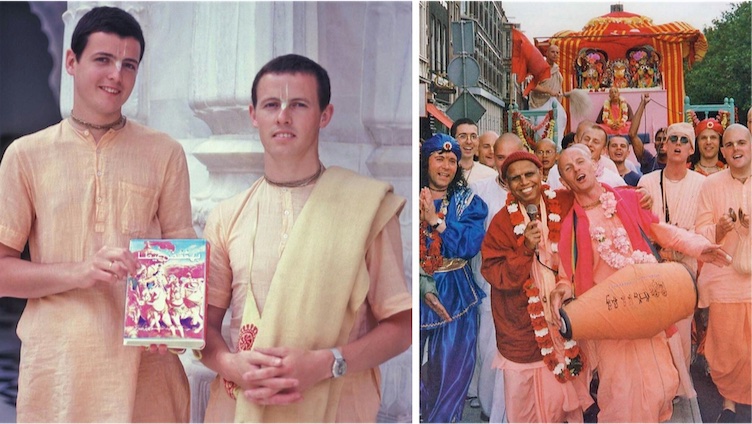
On November 16th, devotees in London celebrated the life of one of Srila Prabhupada’s greatest warriors, who continues to inspire and motivate ISKCON members to this day – Tribhuvanatha Das, who passed away in 2001.
The remembrance festival was in honor of Tribhuvanatha’s birthday or ‘appearance’ day, which is on November 27th according to the Western solar calendar, and on Gita Jayanti day according to the Vedic lunar calendar (December 8th this year).
About seventy to eighty devotees attended the program, from 3pm to 6pm, at the Food For All European Headquarters in Brent Cross, London. Along with kirtan and a prasadam feast, everyone shared memories of the inspirational preacher, known for his raucous kirtans and Hare Krishna Festivals in the UK, Ireland, and Africa.
Tribhuvanatha’s long-time assistant Giridhari Das, who has continued his festival program since 2001, also showed a compilation of video footage and photographs from its successes over the past year. These included seven hall programs, twenty-two Harinamas, eleven Rathayatras, and four outdoor festivals for a total of forty-four events.
Finally, at 7pm, about one hundred devotees participated in a massive Harinama, going down Oxford Street to Picadilly Circus, then returning through Chinatown to the Soho Street Radha Krishna Temple.
“It was very ecstatic,” Giridhari says. “We had mridangas, djembes, and a drum kit and bass guitar connected to a speaker system which we pulled on a rickshaw. Devotees were dancing throughout, and as usual a lot of tourists and locals joined in.”
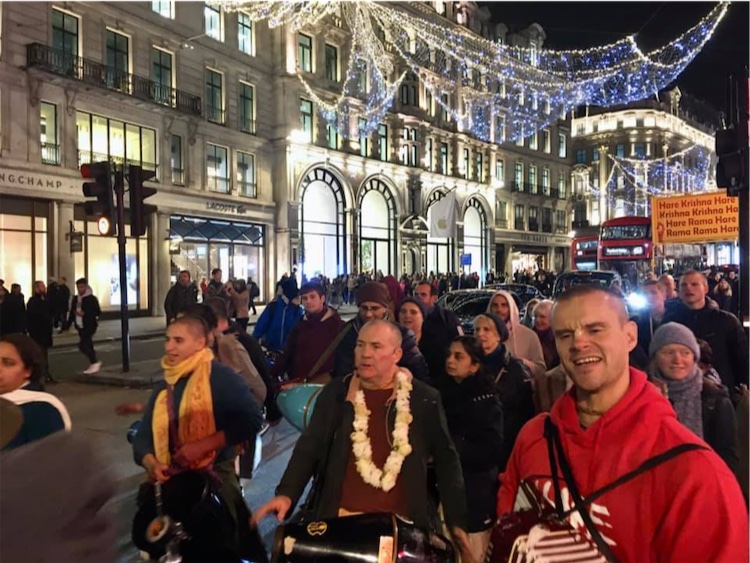
Giridhari Das, who now heads up Tribhuvanatha’s Hare Krishna Festivals program, leads 100 devotees in a remembrance Harinama in Central London
Participating in Harinama, Tribhuvanatha’s favorite activity, brought to life the many memories devotees had shared.
A disciple of Srila Prabhupada, Tribhuvanatha was born Thomas Kevin Heggarty in Longford, Ireland in 1952. His rough childhood saw him in and out of care homes in Ireland, and living on the streets in London. Joining ISKCON in 1968 at just sixteen, he was one of the first devotees made in the UK. His devotion to Srila Prabhupada, enthusiasm, and indomitable spirit immediately endeared him to all the devotees. At seventeen, he was put in charge of London’s Bury Place temple, becoming the youngest temple president in ISKCON.
His routine was simple and powerful. “In the early days, we didn’t have any books, we didn’t have any restaurants, or farms – all we had was mridanga and kartals,” he recalled in one class. “We would get up in the morning, have our full morning program, then we’d go on Harinama from about ten o’clock all day, come back about six, have our evening arati and prasadam, then we’d all go back out again until ten o’clock at night. And that happened every single day except Sunday, every single week.”
Tribhuvanatha became very well-respected for, among many things, his strong dedication to Harinama Sankirtan. “Don’t underestimate this sankirtan movement,” he once said. “Don’t think you have a better idea than God.[Chaitanya Mahaprabhu]”
Later, Tribhuvanatha established a temple in Edinburgh, Scotland and began to arrange large Hare Krishna preaching festivals all around the UK.
Srila Prabhupada attended one of these in Woodside Hall, Glasgow in 1972. Giridhari recalls how Tribhuvanatha told him that at the end of the program, Prabhupada alighted from the stage, walked to where Tribhuvanatha stood at the back of the hall, rubbed him on the head, and said, “I’m very pleased with what you’ve done.”
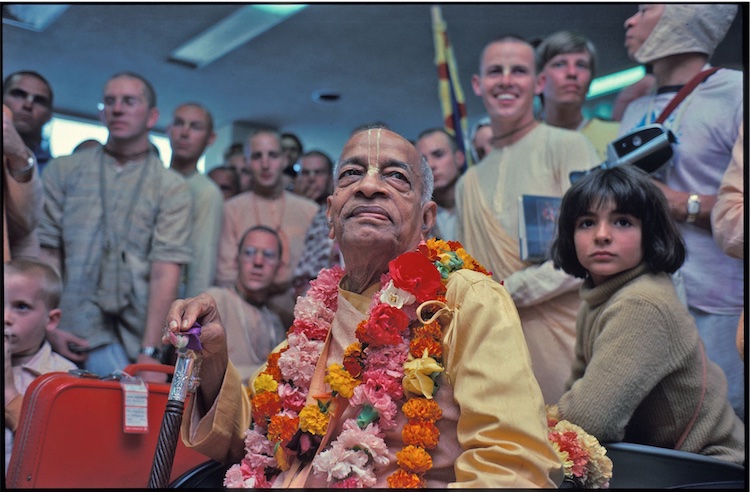
Tribhuvanatha (top right) with Srila Prabhupada
Srila Prabhupada continued to encourage Tribhuvanatha, writing to him in 1974: “You have given me all happy news. The festival success is very encouraging to me. Everyone will like this movement. It is such a nice thing that Sri Caitanya Mahaprabhu has given.”
And in 1975: “If you can stay there in England and continue your festival program, that will be best. It is a very nice program. You should increase it as much as possible.”
Tribhuvanatha often showed his love and dedication to Srila Prabhupada by fearlessly braving dangerous situations for him. In 1978, he travelled to war-torn Beirut, where he arranged for the first publication in Arabic of Bhagavad-Gita As It Is. While on his way to the printer’s, a bomb exploded right in front of his taxi. Terrified, the driver jumped out of the car and ran away. Tribhuvanatha promptly got behind the wheel and drove the rest of the way to the printer’s.
Soon after, in Damascus, he was arrested on suspicion of being a foreign spy, and imprisoned for an entire month in a damp cellar with no windows or lighting, and no room to stand. Making his own beads, he simply chanted Hare Krishna and emerged undaunted.
After some struggles during which he left active service for some years and attempted a job and married life in the outside world, Tribhuvanatha returned with more energy and determination than ever.
In 1987, he revived his Hare Krishna Festival program in the UK, and in 1991 returned to his homeland where he served as president of Govindadvipa Dhama (Inis Rath Island) in Northern Ireland and brought the temple back from the brink of insolvency. He also put on festivals all over Ireland, and opened a Hare Krishna Cultural Centre in Dublin, where young people began joining, drawn by his ecstatic, rocking kirtans, and incisive lectures on Bhagavad-gita philosophy.
In 1995, Tribhuvanatha began touring East Africa annually with his team, attracting huge crowds to free festivals in Kenya, Uganda, Tanzania, Malawi and Zambia. He also inspired the opening of a temple and farm project in Kampala city, Uganda, and a second school in Kisumu, Kenya, where many poor street children were given food, shelter and education.
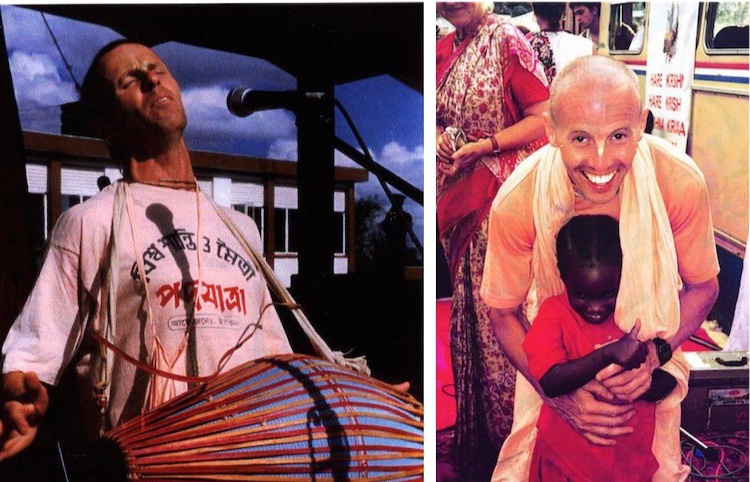
(left) Harinama Sankirtana was Tribhuvanatha’s focus in life (right) Tribhuvanath’s work in Africa gave many poor street children food, shelter, education and of course Krishna
He continued to brave various dangers in the face of Prabhupada’s service, including contracting malaria several times, once fainting on the street and sustaining a crack to his skull.
Giridhari and other devotees observed that Tribhuvanatha always seemed to be “racing against time,” trying to do as much as possible for Srila Prabhupada in his lifetime. He slept very little, often just dozing in a chair for a couple of hours before charging on.
“Tribhuvanatha was like a general,” Giridhari says. “It was actually really exciting for us. You’d get a phone call, and then you’d be off to some other part of the world, opening a center or putting on festivals.”
With so much to do, from a material point of view, Tribhuvanatha could be somewhat disorganized. He often turned up late for flights, carrying a black bin bag he’d just thrown all his stuff into. Planning for festivals could seem haphazard and encounter all sorts of obstacles, but he would simply depend on Krishna, and somehow everything would turn out alright on the night.
At times, devotees on his team would be directed to do something, then get a call as plans changed last minute, asking them to fly halfway across the world or take on a new service. When asked if this kind of spontaneity annoyed her, Vrinda Devi Dasi, a senior lady who was one of Tribhuvanatha’s most dedicated soldiers, responded, “Not at all – if you love someone, you’ll do anything for them.”
Tribhuvanatha inspired this kind of love in all his soldiers, and this leads to his greatest quality.
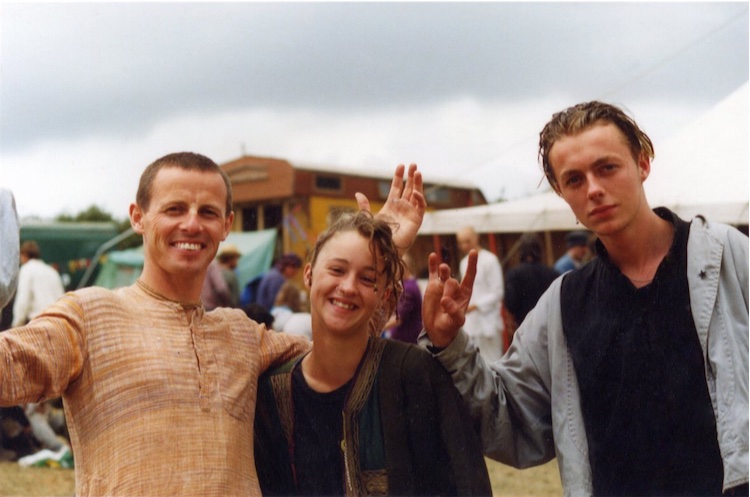
With music festivalgoers in the UK — Tribhuvanatha had a unique ability to relate to everyone and help them as a friend
“He had a lot of care for individuals on a very personal level,” Giridhari says. “He had the openheartedness to embrace all kinds of people – devotees, nondevotees, children, older people. He didn’t exhibit religious superiority, and he didn’t just mouth off textbook answers to questions and problems. He had a sense of solidarity with people who are suffering in this world – he understood where they were at, and how to try to genuinely help them as a friend.”
Giridhari adds: “He could also cut through all of our ‘mentalisms,’ as he called them, to reach into the heart and awaken a very deep relationship with Krishna consciousness. He would often be up late counseling devotees, and would have to chant his rounds through the night.”
In 2001, Tribhuvanatha succumbed to stomach cancer, and passed away that year on October 16th.
“He said he was trying to get better, because all the devotees were very special, and he wanted to keep serving them,” Giridhari recalls.
For himself, he was not concerned, however. When Sacinandana Swami asked him, “Are you afraid of death?” Tribhuvanatha replied, “I’ve faced death so many times, I just think of it as walking from one room to another.”
Tribhuvanatha’s final two wishes were that his festival program would continue, and that devotees would care for one another.
The latter appeared to have come true at his remembrance event. “There was a lot of love in the air amongst the devotees,” Giridhari says. “It was very warm, very sweet. Everyone felt inspired.”
The former is continuing under Giridhari’s guidance.
“We have a formula for the festival program based on what Tribhuvanatha taught us,” he says. “We usually try to do festivals in places where there are devotees who can hire a venue, and then follow up from the interest the festival generates by inviting guests to namahattas, bhakti vriksha groups, temples or centers in the area.”
New devotees are starting to get involved in the festival program now, many of whom never even met Tribhuvanatha, but are inspired by his example.
“The formula works, and we hope we can teach the next generation to take it up,” Giridhari says. “In that way, I think there’s hope for it to continue into the future.”














